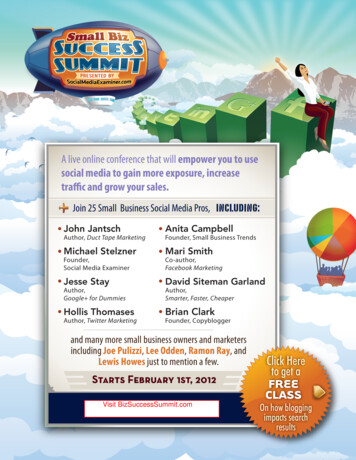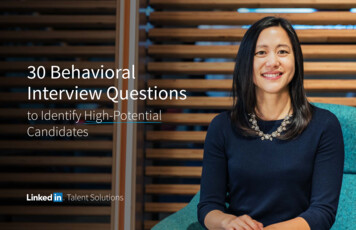
Transcription
30 BehavioralInterview Questionsto Identify High-PotentialCandidatesTalent Solutions
Table of contentsWhy behavioral interview questions matter36 soft skills that reflect potential4Adaptability questionsCulture add questions579Collaboration questionsLeadership questions11Growth potential questions13Prioritization questions15Creative questions1730 Behavioral Interview Questions 2
Why behavioral interviewquestions matterGreat businesses are built on people. People who not only havethe right skills and experience, but who have the potential todo great things in the role, the team and in the company.However, screening candidates for potential is the toughestpart of an interview. Oftentimes you assess someone’spotential by looking at their soft skills and unqiue perspectives.Yet in a 30 minute conversation, it’s really difficult to fullyunderstand the person behind the profile.The good news is that behavioral interview questions are aproven way to reveal a person’s potential, specifically theirability to adapt, grow, collaborate, prioritize, lead, andstrengthen company culture. By looking at their past behavioras well as their skills and experience, you’ll instinctively knowif they have all the qualities you need in your next hire.To help you be more efficient and effective, we surveyed nearly1,300 hiring managers for their top behavioral interviewquestions. Scroll through for the best questions to ask, andtips to glean the answers you need.30 Behavioral Interview Questions 3
6 soft skills that reflect potentialPotential can be interpreted many ways, but there are common soft skills and characteristics found among successful hires and high-potentialpeople. Here are the most important soft skills hiring managers look for during interviews (ranked in order of importance):1 Adaptability4 Leadership2 Culture add5 Growth potential3 Collaboration6 Prioritization30 Behavioral Interview Questions 4
Adaptability30 Behavioral Interview Questions 5
How to screen foradaptability69%of hiring managers say adaptability is the mostimportant soft skill they screen for. It makes sense to stay competitive today, your company needs to beable to adapt to a changing economy and businessneeds. That means you need employees who canadapt as well, and high-potential people often havethis ability.Here are some of the most popular questions to ask:M O ST P O P U L A R1Tell me about a time when you were asked to do something youhad never done before. How did you react? What did you learn?2Describe a situation in which you embraced a new system, process,technology, or idea at work that was a major departure from theold way of doing things.3Recall a time when you were assigned a task outside of your jobdescription. How did you handle the situation? What was the outcome?4Tell me about the biggest change that you have had to deal with.How did you adapt to that change?5Tell me about a time when you had to adjust to a colleague’s workingstyle in order to complete a project or achieve your objectives.30 Behavioral Interview Questions 6
Culture add30 Behavioral Interview Questions 7
How to screen forculture addWhen we talk about culture fit, we don’t mean fallinginto a “hire like me” mentality. If all of your employeesact and think the same, your company won’t thrive.Instead, look for candidates who share the samebeliefs and values as your organization, but alsobring diversity of thought and experience that willdrive your company forward. We call this a “cultureadd”. Plus, research shows that employees who area good culture fit are more likely to stay with yourcompany and will have greater performance andjob satisfaction.Here are some of the most popular questions to ask:M O ST P O P U L A R1What are the three things that are most important to you in a job?2Tell me about a time in the last week when you’ve been satisfied,energized, and productive at work. What were you doing?3What’s the most interesting thing about you that’s not onyour resume?4What would make you chose our company over others?5What’s the biggest misconception your coworkers have aboutyou and why do they think that?30 Behavioral Interview Questions 8
Collaboration30 Behavioral Interview Questions 9
How to screen forcollaborationDone right, collaboration keeps the business moving ata fast pace. Done wrong, employees find it extremelydistracting. When you look at an organization’s topcollaborative contributors, and look at employees whoare recognized as top performers, there is about a50%*overlap. So hiring people who can collaborate effectivelyand work well with others is essential to success.Here are some of the most popular questions to ask:* Collaboration OverloadM O ST P O P U L A R1Give an example of when you had to work with someone whowas difficult to get along with. How did you handle interactionswith that person?2Tell me about a time when you were communicating with someoneand they did not understand you. What did you do?3Tell me about one of your favorite experiences working with a teamand your contribution.4Describe the best partner or supervisor with whom you’ve worked.What part of their managing style appealed to you?5Can you share an experience where a project dramatically shifteddirections at the last minute? What did you do?30 Behavioral Interview Questions 10
Leadership30 Behavioral Interview Questions 11
How to screen forleadershipResearch shows that organizations with high qualityleaders are13xmore likely to outperform their competition.* During theinterview, assess if the candidate can inspire, motivate,and unleash potential in others.Here are some of the most popular questions to ask:* 10 Ways to Grow Leaders in Your BusinessM O ST P O P U L A R1Tell me about the last time something significant didn’t goaccording to plan at work. What was your role? What wasthe outcome?2Describe a situation where you needed to persuade someone to seethings your way. What steps did you take? What were the results?3Give me an example of a time when you felt you led by example.What did you do and how did others react?4Tell me about the toughest decision you had to make in the lastsix months.5Have you ever had to “sell” an idea to your coworkers or group?How did you do it? What were the results?30 Behavioral Interview Questions 12
Growth potential30 Behavioral Interview Questions 13
How to screen forgrowth potentialToday’s fast-paced work environments requireemployees who can do the job now, and have thepotential to grow into new roles or leadershippositions at your company in the future. After all, ifan employee leaves, it costs your company1.5xthat employee’s salary to replace her.* That meansthat hiring people who have the potential to growwithin your company not only saves you the pain ofreplacing them, but also saves you money.You can predict if a candidate has what it takes byscreening for goal setting and self-motivation. Hereare some of the most popular questions to ask:* Why More Employees Are Considering Leaving Their CompaniesM O ST P O P U L A R1Recall a time when your manager was unavailable when aproblem arose. How did you handle the situation? With whomdid you consult?2Describe a time when you volunteered to expand your knowledgeat work, as opposed to being directed to do so.3What would motivate you to make a move from your current role?4When was the last occasion you asked for direct feedback from asuperior? Why?5What’s the biggest career goal you’ve ever achieved?30 Behavioral Interview Questions 14
Prioritization30 Behavioral Interview Questions 15
How to screen forprioritizationWhen juggling multiple tasks, we have to be able todecide which ones need to be tackled immediately, andwhich ones can wait. Hiring someone who can’t get thisright means that key due dates and project timelinescan fall through the cracks, ultimately hurting yourbusiness. People who can manage their time andprioritize effectively will help your business thrive.M O ST P O P U L A R1Tell me about a time when you had to juggle several projects at thesame time. How did you organize your time? What was the result?2Tell me about a project that you planned. How did you organizeand schedule the tasks?3Describe a time when you felt stressed or overwhelmed. Howdid you handle it?4Give an example of a time when you delegated an importanttask successfully.5How do you determine what amount of time is reasonable fora task?Here are some of the most popular questions to ask:30 Behavioral Interview Questions 16
Creative Questions30 Behavioral Interview Questions 17
Leaders share their most creative questionsTo keep things interesting, we collected unconventional questions that top business and talent leaders like to ask. Sprinkle in one of these duringyour interview. The answer can reveal a lot about the candidate’s personality and the way they think.12345“Why shouldn’tI hire you?”“How would yourmanager describeyou? Now tellme, how wouldyour best frienddescribe you?”“It’s 12 p.m.one year fromnow. What areyou doing?”“Is better to submita project that’sperfect and late,or one that’s goodand on time?”“On a scale of1 to 10, howweird are you?”Adam GrantWharton professorand best-sellingauthorKrista WilliamsAngela BortolussiPartner at SocialRecruitingTony HsiehCEO at ZapposObed LouissantVP of HR at IBMTalent AcquisitionManager at Swarovski30 Behavioral Interview Questions 18
Get the answers you needWhile these interview questions help you identify high-potential candidates and select the best, asking the right questions doesn’t guarantee greatanswers. Push candidates to give you better information by doing the following:1234Use the S.T.A.R.system: As thecandidate answerseach question, makesure they describethe Situation, Task,Action, and Result.Don’t except situationalresponses: Whenyou ask for specificexamples, make surecandidates don’t give yousituational (hypothetical)information.Give them time: Oftengood answers comeafter a moment ofreflection, so don’t rushcandidates or writethem off if they don’tanswer quickly.Follow up: Hone inon a specific piece ofmissing informationin their response todig deeper into thesituation.30 Behavioral Interview Questions 19
Be prepared for the reverse interviewAfter putting candidates in the hot seat, they’re ready to turn the tables on you. Give them the info they’re hungry for: 70% of candidate say they wantmore details into the role & responsibilities, followed by how they fit within the team, and information about the company mission and vision*.Be prepared to answer the following questions:123456What’s the biggestopportunityfor this role?What’s the mostchallengingelement aboutthis role?What doessuccess looklike in thisposition?If you coulddescribe yourteam in 3words, whatwould they beand why?What typeof person isworks wellwith this team?How did thecompanydetermine itsmission?Why dopeople say* Inside the Mind of Today’s Candidateabout yourcompany?30 Behavioral Interview Questions 20
Can’t get enough?If you’re still hungry for interview questions, there’s somuch more on the LinkedIn Talent Blog, which coverseverything you need to know to be great at your job.Scroll through them here, or check out these popularinterviewing articles:3 Interview Questions to Ask Every Marketing Job Candidate9 Unexpected Interview Questions That Reveal a Lot AboutCandidatesWhen Warren Buffett Hires, He Looks For These 3 Key TraitsRecruiters Nominate Their Favorite Phone InterviewQuestionsWhat Recruiters Get Wrong When It Comes to Interviews30 Behavioral Interview Questions 21
MethodologyIn May 2016, LinkedIn surveyed 1,297 Hiring Managersin the US, Canada, UK, Netherlands, Australia and India.Hiring Managers are defined as those who currentlymanage people and either recently hired, are currentlytrying to hire or are planning to hire new people fortheir team (based on survey responses). Memberswere selected at random to take our survey and arerepresentative of the LinkedIn sample. The LinkedInsample (and our analysis) is influenced by howmembers choose to use the site, which can vary basedon professional, social, and regional culture, as wellas overall site availability and accessibility. Thesevariances were not accounted for in the analysis.About the authorsLydia AbbotBlog Editor & Associate Content Marketing ManagerMaria IgnatovaGlobal Content Marketing Lead, ThoughtLeadership and InsightsAllison SchnidmanSenior Manager, Research Operations30 Behavioral Interview Questions 22
About LinkedIn Talent SolutionsLinkedIn Talent Solutions offers a full range of recruiting solutions to helporganizations of all sizes find, attract, and engage the best talent. Foundedin 2003, LinkedIn connects the world’s professionals to make them moreproductive and successful. With over 500 million members worldwide,LinkedIn is the world’s largest professional network.Visit our websiteRead the blogFollow us on LinkedInLike us on FacebookAccess presentations on SlideShareFollow us on Twitter LinkedIn Corporation 2017. All Rights Reserved.
3 Interview Questions to Ask Every Marketing Job Candidate 9 Unexpected Interview Questions That Reveal a Lot About Candidates When Warren Buffett Hires, He Looks For These 3 Key Traits Recruiters Nominate Their Favorite Phone Interview Questions What Recruite
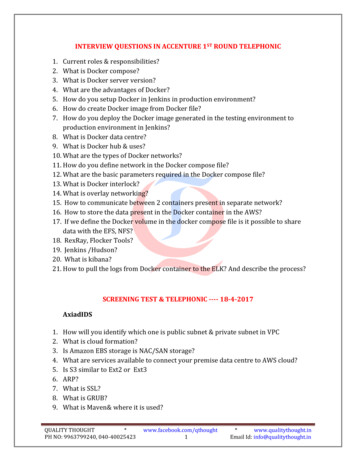

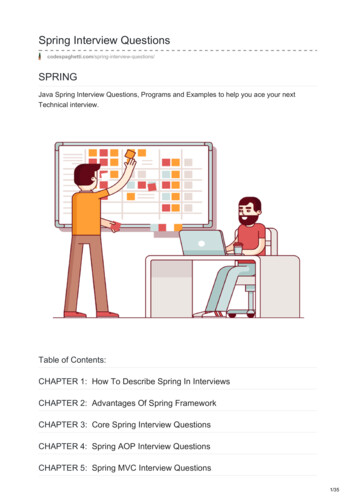
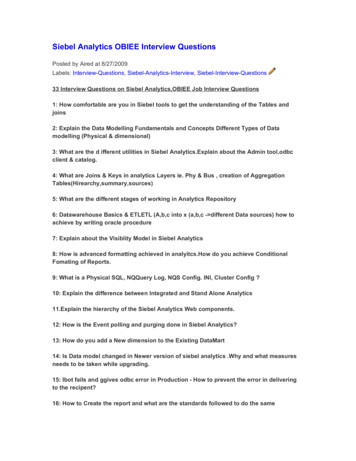

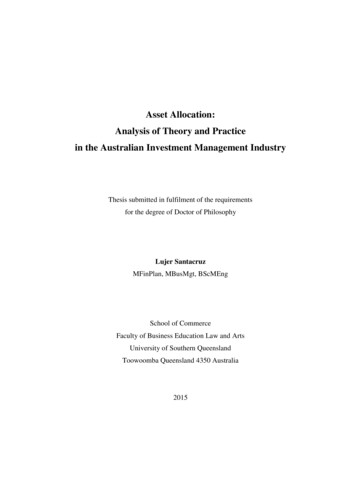
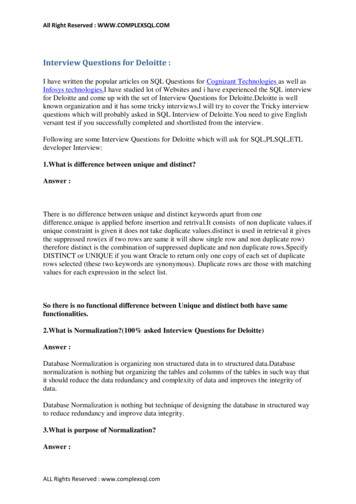
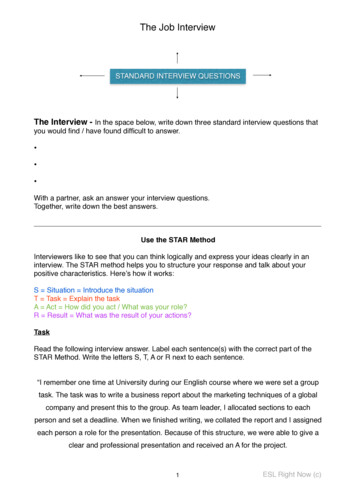
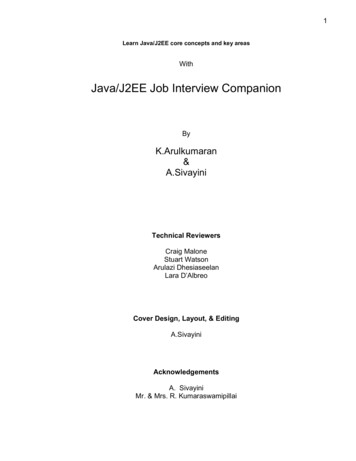
![Informatica Interview Questions and Answers [Scenario-Based]](/img/2/informatica-interview-questions-and-answers-scenario-based-1.jpg)
